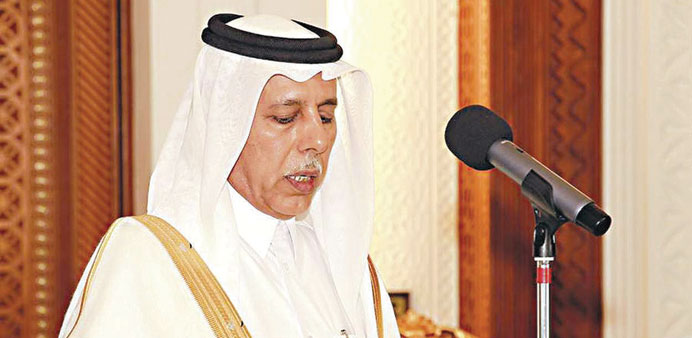|
The Cabinet yesterday approved the recommendations of a committee that advised the payment of workers’ wages through banks binding on all employers in the country. |
The committee was formed to study a “wage protection system” (WPS) that would ensure timely payment of workers’ salaries.
“According to the recommendations, a comprehensive electronic system is to be created and handled by Qatar Central Bank (QCB). It will be managed jointly with the Ministry of Interior, the Ministry of Labour and Social Affairs, and the financial institutions, establishments and companies,” a statement issued by HE the Deputy Prime Minister and Minister of State for Cabinet Affairs Ahmed bin Abdullah bin Zaid al-Mahmoud after the Cabinet meeting, said.
Under the wage protection system, employers are to be obliged to transfer wages to the bank accounts of workers. The Minister of Labour and Social Affairs will issue a decision on this matter and toughen punishment for offenders.
“These recommendations stipulate the amendment of Articles 1, 66, 145 of the Labour Law issued as Law No 14 of 2004,” QNA quoted from the minister’s statement.
According to an earlier report in the local media, the government plans to implement the wage protection system in three phases.
The first phase will cover companies with 500 and more employees, while in the second phase companies with 100 to 500 workers will be included, it said.
“In the third and last phase, all companies with less than 100 workers will be asked to transfer salaries of their workers to their respective bank accounts.”
The Wage Protection System will be mandatory for all companies, whether private, government or semi-government.
The workers would need to be paid salaries in the first week of every month through bank transfers.
Delays would attract punitive action in the form of fine.
Currently, a large number of companies do not transfer wages of their low-income workers to banks and rather pay them in cash.
As a result, it was difficult for the Ministry of Labour and Social Welfare to monitor salary payments by companies. Delays and defaults in payment of salaries have been reported in several cases.
An extensive database is being developed by the Ministry of Interior and the Ministry of Labour and Social Welfare which will specify who is to be included in the ‘Wage Protection System’ and who is not.
Last month, banking regulator, the Qatar Central Bank (QCB), asked all banks to provide it account details of all their customers.
On the other hand, companies have been asked to provide the labour ministry salary details of all their employees.
Meanwhile, yesterday’s Cabinet meeting also approved the following two draft decisions of the Minister of Environment:
A. The adoption of the conversion of some Qatari standards to binding Qatari technical regulations.
The table attached to the decision includes six standards on switches of household electrical appliances, cosmetics, and ethanol-based aromatic lotions.
B. The adoption of Qatari technical regulations and standards.
The first table attached to this decision features 35 technical regulations and the second includes 216.
The Cabinet also approved a decision to exempt beIN (a private institution with a public benefit) from all kinds of fees and taxes.
The Cabinet also approved the validity of the provisions of Law No 24 of 2002 on retirement and pensions of Qatari employees working with the following :
1. Qatar First Bank (QFB).
2. Qatar Electronic Systems (Techno Q).
3. Qatar Investment and Projects Development Holding Company (QIPCO).
The Cabinet then reviewed the following and took the appropriate decisions:
1. A draft law on the regulation of human organ transplantation.
2. The letter of the Minister of Economy and Trade on a proposal to amend the commercial companies related law.

